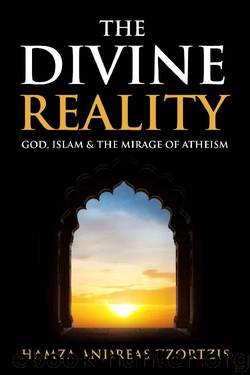The Divine Reality: God, Islam & the Mirage of Atheism by Hamza Andreas Tzortzis

Author:Hamza Andreas Tzortzis [Tzortzis, Hamza Andreas]
Language: eng
Format: epub
Publisher: FB Publishing
Published: 2017-02-16T06:00:00+00:00
One of the creators overpowers the other by moving the rock in a different direction from the other.
They both cancel each other out, and the rock does not move.
They both move the rock in the same direction.
The first scenario implies only one will manifests itself. The second scenario means that there is no will in action. This is not possible because there must be a will acted upon, as we have creation in existence. The third scenario ultimately describes only one will. Therefore, it is more rational to conclude that there is only one creator because there is only one will.
If someone argues that you can have more than one entity and still have one will, I would respond by asking: How do you know there is more than one entity? It sounds like an argument from ignorance, because there is no evidence whatsoever for such a claim. This leads us to the next argument.
Conceptual differentiation
For two creators to exist, they must be different in some way. For example, if you have two trees, they will differ in size, shape, colour and age. Even if they had identical physical attributes, there would be at least one thing that allows us to distinguish that they are in fact two trees. This can include their placement or position. You can also apply this to twins; we know there are two people because something makes them different. This could even be the mere fact that they cannot occupy the same place at the same time.
If there were more than one creator, then there must be something to differentiate between them. However, if they are the same in every possible aspect, then how can we say there are two? If something is identical to another, then what is true of one is also true for the other. Say we had two things, A and B. If they are the same in every way, and nothing allows us to differentiate between them, then they are the same thing. We can turn this into a hypothetical proposition: If whatever is true of A is true of B, then A is identical to B.
Now let us apply this to the Creator. Imagine that two creators exist, called creator X and creator Y, and that whatever is true of creator X is also true of creator Y. For instance, creator X is All-Powerful and All-Wise; so, creator Y is All-Powerful and All-Wise. How many creators are there in reality? Only one, due to the fact that there is nothing to differentiate between them. If someone were to argue that they are different, then they would not be describing another creator but something that is created, as it would not have the same attributes befitting the Creator.
If someone is adamant in claiming that there can be two creators and they are different from each other, then I simply ask, “How are they different?” If they attempt to answer the question, they enter the realm of arguing from ignorance, because they will have to make up evidence to justify their false conclusion.
Download
This site does not store any files on its server. We only index and link to content provided by other sites. Please contact the content providers to delete copyright contents if any and email us, we'll remove relevant links or contents immediately.
From Bacteria to Bach and Back by Daniel C. Dennett(2481)
The God delusion by Richard Dawkins(2305)
Boy Erased by Garrard Conley(1727)
THE SELFISH GENE by Richard Dawkins(1620)
The Falls by Unknown(1520)
God Is Not Great by Christopher Hitchens(1326)
Christopher Hitchens by The Portable Atheist: Essential Readings for the Nonbeliever(1317)
Outgrowing God by Dawkins Richard(1314)
the god delusion by richard dawkins(1313)
THE GOD DELUSION by Richard Dawkins(1308)
Drunk with Blood: God's Killings in the Bible by Steve Wells(1280)
Triumvirate of Rationalism: Thomas Paine, Thomas Jefferson, and George Orwell by Christopher Hitchens(1278)
The Rage Against God by Peter Hitchens(1262)
About the Holy Bible by Robert G. Ingersoll(1260)
The Atheist Muslim by Ali A. Rizvi(1226)
Atheism: A Very Short Introduction by Julian Baggini(1215)
Why I Am Not a Christian and Other Essays by Bertrand Russell(1180)
Battling the Gods by Tim Whitmarsh(1150)
Emancipation of a Black Atheist by D. K. Evans(1147)
